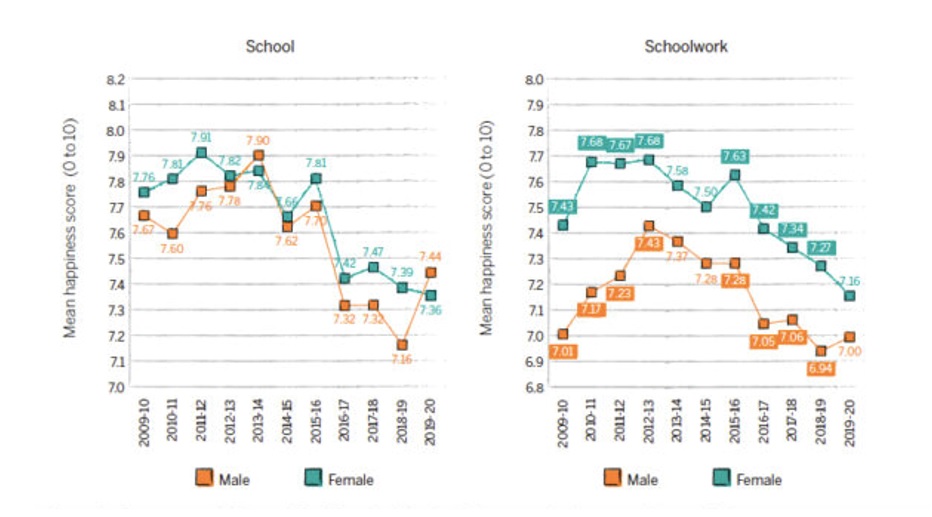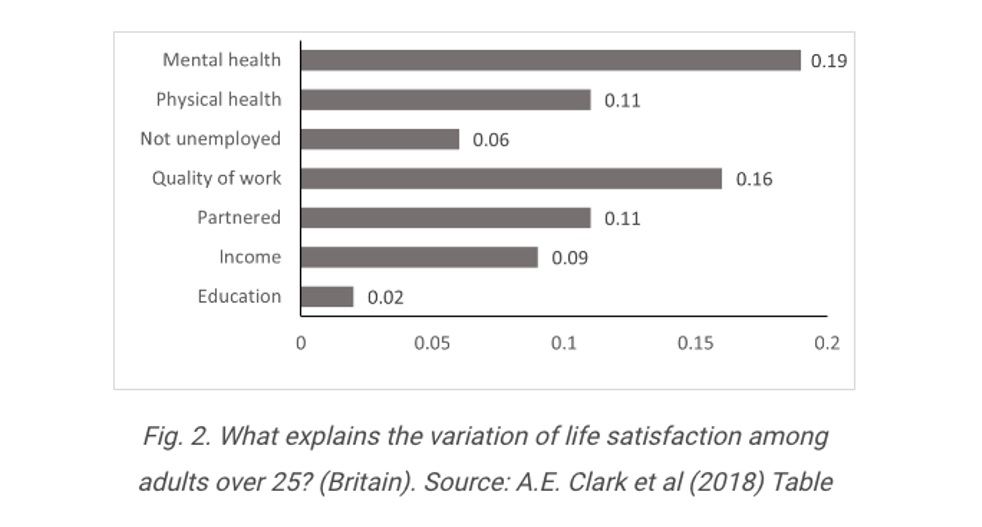It is not just school buildings that are at risk of crumbling – data show that levels of happiness among both pupils and teachers are plummeting. To address these failings, argues Tim Linehan, a new approach is needed – one that puts wellbeing at the heart of education policies.
There’s a debate in education about classroom behaviour which has been going on since time immemorial. This debate focuses on two polarised positions. One school views unruly, badly behaved pupils as undermining education for both themselves and others. Their behaviour is seen as unacceptable, indicative of a wider social deviancy and requiring correction through discipline. On the other side are those who see behaviour as communication and that “bad” behaviour is often symptomatic of other difficulties in a child’s life, for example, neurological conditions such as autism or ADHD. The behaviour is viewed as potentially the result of trauma or problems at home.
This side argues for an inclusive approach that understands and guides rather than punishes children who think differently simply because their brains are wired differently, or because of their difficult lives, or both. Their talents are crushed, their esteem undermined and school becomes a deeply unhappy and damaging place. But what if this fractious debate is a sideshow to the wider problem, that the education system is not only failing to support children who have additional needs, but teachers as well, and that both pupils and teachers are victims in a failing system?
Wellbeing is the key
In March this year, Richard Layard and Jan-Emmanuel De Neve wrote a blog arguing that the new science of wellbeing should be put at the heart of all policy and decision-making. Lord Layard is an economist who has pioneered the science of wellbeing. He applied his learning to children when he co-authored the findings from The Children’s Society’s Good Childhood Inquiry.[1]
Layard and De Neve argued that the true goal of society should be the happiness of its people. They quote Thomas Jefferson: “The care of human life and happiness is the only legitimate object of good government.” Importantly, they argue that happiness should be fairly distributed. Yet according to the World Happiness report, a fifth of people rate their happiness as very low. Moreover, although there are different levels of happiness between countries, 80 per cent of the variation of happiness is within countries. They also show that the most important single determinant of individual wellbeing is mental health.
Their conclusion is that all countries need to develop policies with a focus on wellbeing. If they’re right, how would this idea be applied to schools?
Happiness in school
Let’s look at the current state of childhood happiness in school. This is from The Children’s Society’s Good Childhood report:

The figures show that, relative to other aspects of their lives, schools score low on wellbeing measures and that overall happiness is in decline. The authors conclude: “It is clear from the report that education is a source of unhappiness for a proportion of children.”
Returning to Layard and De Neve, they argue that there is a “very strong tie” between how we feel and how productive we are. They specifically analyse this impact, calculating that feeling better by one point on a scale from zero to 10 can translate into an improvement in productivity of at least 13 per cent. So, if we want children to perform better at school, we should recognise that improving wellbeing may have more to offer than a strict focus on attendance and attainment.
People are more likely to behave badly if they are unhappy. So having looked at children, how happy are teachers? And how does their happiness affect them? To be clear, there is no blame implied on either group: the point is to investigate what happens when you crank up a system to breaking point in order to achieve unrealistic goals by using the wrong means.
Teacher wellbeing
The charity Education Support, which promotes the wellbeing of teachers and education staff, publishes an annual index on teachers. In 2022, record numbers of UK education staff considered leaving the sector in the past academic year due to pressures on their mental health and wellbeing. It found that 78 per cent of staff experienced mental health problems due to their work, 42 per cent of staff always believe their organisation’s culture has a negative effect on their wellbeing, and 75 per cent of education staff described themselves as stressed.
The main drivers of stress were lack of trust. A disturbingly high proportion, 92 per cent, said they felt they were distrusted by their line manager; 59 per cent said they weren’t confident in “disclosing issues” to their employers. When asked why they wanted to leave teaching, highest on the list was workload, work/life balance and feeling undervalued. Pupil behaviour came in eighth, more or less the same as “target-driven culture”, mental health, pay and unreasonable demands from managers.
Poor teacher mental health has an impact on pupil learning.
These are extraordinarily bad figures. The lack of trust is particularly disturbing. According to the Harvard Business Review people working for “high trust companies” report 74 per cent less stress, 106 per cent more energy at work, 50 per cent higher productivity and 40 per cent burnout. We know that stress reduces cognitive functioning and the brain is less able to make simple decisions. Poor teacher mental health has an impact on pupil learning.
A system failure
There is very little consolation to be found in any of these findings, but they demonstrate the need for an education reboot. No profession can perform well under the conditions that teachers report. If teachers are not supported, they will be unable to teach their classes effectively, let alone work constructively with their more demanding pupils. Criticism of the school system is read as an attack on the teaching profession. As professor Tim O’Brien puts it, “In toxic teams/systems, respectful challenge has to be very quickly framed as negative input in order to deliberately shut down any form of reflection and, of course, to maintain the toxic status quo.”
If teachers are unhappy at work – for further evidence, just look at staff retention figures – and children’s happiness in school is plummeting, we suspect particularly among those who have additional life challenges, what are schools for? Who do they serve? it feels that there is no other conclusion to draw than that the system has lost its focus. The evidence for rethinking schools along wellbeing lines, giving school staff more agency and support all pupils as their complex job requires must, at the very least, be worth investigating.
If we adopt Layard and De Neve’s principle that happiness should be equally distributed, we have to focus more on children with SEND, who have lower levels of wellbeing at school and also address the equality gap. We know that children with SEND are more likely to come from poorer families and that SEND is both a cause and an effect of poverty. These are the children who are least likely to enjoy school. We know that SEND support in education isn’t working well, absenteeism is increasing, and happiness is in decline. This puts additional pressure on teachers and on the school system as a whole. At present, though, whether we measure the happiness of children or staff, the system is failing, and its impact is felt most brutally by the children who struggle the most. It’s time for a reboot.
[1] Disclosure. I developed the philosophical framework and commissioned research for the Good Child Inquiry
All articles posted on this blog give the views of the author(s), and not the position of LSE British Politics and Policy, nor of the London School of Economics and Political Science.
Image credit: Pixabay/Pexels








